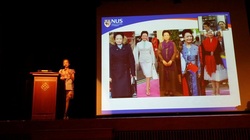 It was my great honor to be invited to make a spotlight presentation for the Chinese Internet Research Conference held at Hong Kong Polytech University this year! Thanks to David Herold, the organizers, and the steering committee for the flattering and daunting task! I still vividly remember that in 2007, I was also very fortunate to be given the top student paper when CIRC was held in Texas A&M hosted by Randy Kluver. Now seven years later, I ask myself what better I can offer to the community. I am not sure whether I have become a better researcher but at least, I am no longer alone. This time I have two fabulous collaborators, Dai Jia and Yang Tian, both from Tsinghua University. Their diligent working attitude and generous support have been the most critical reason why the paper is all possible. I opened the presentation with an example of China's current first lady, Peng Liyuan. While the international society sees Peng as the first ever Chinese first lady who can rival Obama's Michelle, many Chinese know Peng as a popular star. She has appeared in the first ever Spring Festival Gala and since then, her songs have been hits in China. Some media reports praise her for enhancing the national image by smiling and posing to the cameras. And for many Chinese, the fact that we know her, or her voice, so well has brought a sense of familiarity to the new leadership. Both the internal and external roles Peng has played in China's political life have every thing to do with her life of being a popular singer. I continued saying that this is definitely not just a Chinese case. The blurring boundary between popular culture and politics has been witnessed around the world. This observation has brought some scholars a great deal of uneasiness. Popular culture turns people from rational citizens to passive spectators, who watch their favorite stars preform but make no actions themselves. They may also become fanatic followers, who blindly do whatever their idols ask them to do. The fascination with celebrities makes citizens pay more attention to superficial qualities such as how one looks or how one speaks, and ignore the substantial criteria of being a politician such as experience, policy ideas, and visions. However, this worry is nothing new. As early as in the Ancient years in China, poets (popular singers at that time) already used poems (popular songs at that time) to mock and criticize the emperors and their empires. I argue that what we should worry about isn't whether popular culture is good or bad for politics (because politics is never simply good or bad). What we should worry about is why we still know so little about popular culture and politics, the endless seeking for pleasure, the strong desire for emotions, the structures of feeling! I argue that it is because our theoretical perspectives to examine politics are limited. One idealistic perspective sees everyday politics as deviant cases from the ideal model of democracy, such as rational debate indicated in Habermasian public sphere. Another realistic but a bit cynical perspective sees politics as power competition. It is all about exchange of interests (e.g., Bourdieu's theory of capitals). It is my argument that we should look at politics as performance. If we take this perspective, our focus is no longer on what is right and what is wrong. Politics is a matter of aesthetics and taste. We should ask, what is preferred, what is enjoyed, what is appreciated. We also would not see politics as a battle between the powerful and the powerless. How does the powerful repress the powerless, how does the powerless fight against the powerful. Instead, we talk about a relationship of performers vs. audiences. The dynamics of this relationship is much more subtle and complicated than simply being a competition among powers. Think about it: A show is not a show without audiences. If we see politics as performance, we may ask why celebrities want to perform politics. An obvious reason is to say celebrities use these political issues to keep their names in news. But why news? Why not the list of parliament members? It is because the importance of mediation is unprecedented nowadays. Although popular culture has always been a part of political communication, what marks our age is the extreme importance of mediation. We now have celebrities who are famous for being famous. They have no distinctive background, they have no outstanding achievement, they are not even pretty. Think about Furong Jiejie. What has made them so well known is the repeated exposure in media coverage. I concluded the theoretical part of this presentation with a research agenda, dictated by the perspective of politics as performance. I ask:
Although there is another methodological point I made about network analysis, I hope readers can stop at the theoretical points and think about how a perspective of politics as performance could inform our inquiry about Chinese Internet. A digital copy of the presentation is not posted in response to the conference audiences' concern of leaking privacy information of the celebrities and their followers. You are always welcome to write to me for the slides!
1 Comment
2013年年初发表在《中国传播学刊》的这篇文章,有幸受到了翻译社群的关注,得到了赵嘉敏(译言创始人)的转发。两个很有趣的网站,政见和北大新媒体也做了这个研究的分享。这些回应都符合我们做学术与现实结合的action research的初衷,在此表示感谢。
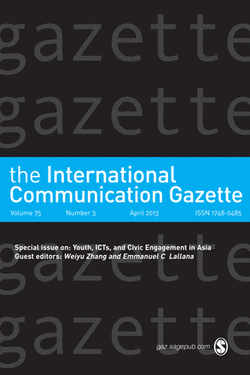 Our special issue on "Youth, ICTs and Civic Engagement in Asia" is published in International Communication Gazette!!! Thanks to my co-editor and project head Emmanuel Lallana, and dear collaborators Clarissa David, Mohammad Sahid Ullah, P. Vigneswara Ilavarasan, and Joanne Lim! Speical thanks to the editor, manager, and proofreader of this journal too. They are all so professional that this issue gets published smoothly and timely. Highly recommend my colleagues to submit to this journal! You can download the entire issue HERE! A table of content is found here. I was invited to deliver a keynote lecture for the 22nd International Youth Forum in Seoul, organized by The Ministry of Gender Equality and Family and The National Council of Youth Organizations in Korea. It was a great opportunity for me to ponder on what I have done in the last three years when trying to run a six-country comparative research project. I really did not want to lecture my audiences as they probably have heard much in school. The four words in the title are among the most meaningful to me in the recent years. It is a speech that targets myself as well.
The two sections on Change and Youth are presenting the factual observations I had during my research trips. The last two on Failure and Excellence tried to convey a message: Excellence does not require success and heading to a highly possible failure is a brave choice that already indicates excellence. Allow me to insert an excerpt here: "Alright. It seems that failure is a given fact and success is only the beautiful scenery we enjoy on our way to greater failure. So what are we trying to achieve here? What are we challenging ourselves to get? What are we risking our comfort for? If it is neither success nor failure, what is it? It is excellence. Excellence, by definition, means the fact or state of excelling. To excel is to surpass the ordinary standards. As long as we are trying to surpass what have been achieved by either others or ourselves, we are excelling or we are headed towards excellence. A sportsman excels when she breaks her own record. A student excels when she learns new knowledge. A politician excels when she speaks for the neglected. Excellence is different from success because it is more about your own pursuit than conforming to how others judge you. It is you who decides what to excel, how to excel, and when to stop. As long as a person excels in her own regard, we should show our full respect." I truly thank my colleague Catherine Candano for reviewing the manuscript and giving me feedback. A full manuscript can be found here. I am totally excited by this upcoming project that NUS is organizing. During the brainstorm meeting, I threw my brain into the storm and proposed a migrant worker study that tries to apply ICTs into supporting the long-distance relationship between the workers and their rural families. The more I think about it, the more I feel that my current research paradigm is challenged.
1. The inter-disciplinary nature of this project: Previously my experience of multiple disciplines is limited to my own exposure to theories and research from different disciplines. But the purpose of the studies is the same -- to answer a question or to test a hypothesis. This project includes people from the computing school, the design school, and the social sciences. The purpose of this project is not just about research. It puts more emphasis on applications. 2. The problem-solving orientation of this project: I have never done a research that really solves a problem or implements a solution. The factors I will consider are quite different here. I become less concerned about the cleanness of my design (e.g., internal validity) than the success of solutions. Dr. Hornick (Annenberg, UPenn) once said that the most sucessful campaign might be the most messy campaign that mobilizes all possilbe social forces. 3. Poor people still have social needs: Probably becasue of my acceptance of Maslow's hierachy of needs, I did not realize that I put physiological needs ahead of any other needs and assumed that without satisfying the physicological needs, no other needs should be considered. This is not true. Social needs such as love and belonging do not come after physicological needs . They exist along with the physiological needs. Therefore, we should use technolgoy to address these needs. A final note: there is no useless reading. I do not know why I started reading books about Chinese rural communities during summer. I simply felt interested. Now the project comes. Now I see the value of reading all items from Baidu news search with the key word "peasants" for three months. |
Weiyu Zhang
I am an Associate Professor at Department of Communication and New Media, National University of Singapore. Categories
All
Archives
January 2019
|
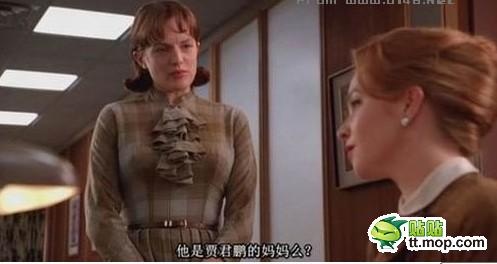
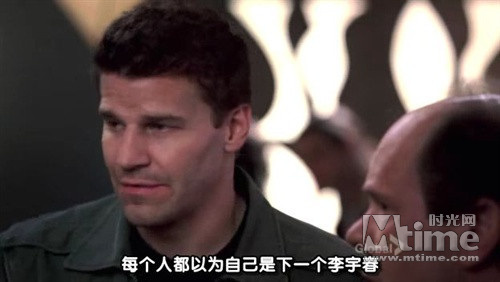
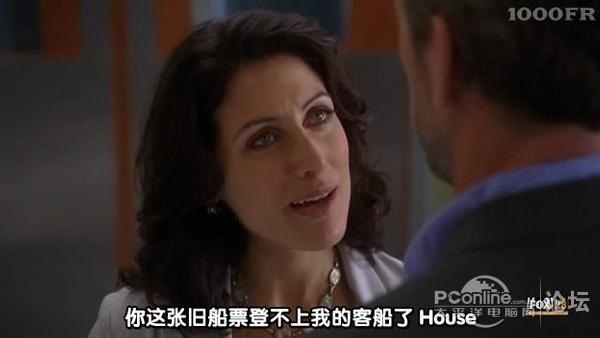
 RSS Feed
RSS Feed
